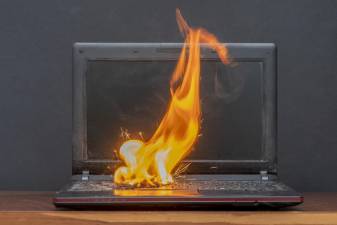State issues safety tips on lithium-ion battery use for consumers
Warwick. The state-wide “Buy Safe, Charge Safe” campaign comes after the region experienced several fires related to the use or storage of lithium-ion batteries.

Governor Kathy Hochul recently announced a statewide campaign to raise awareness about the safe use of consumer products that contain lithium-ion batteries, such as e-bikes, e-scooters, hoverboards, smart phones, laptops, toys and power tools. The move comes after the area has seen several house fires started by lithium-ion batteries in such goods, not to mention the fire that Warwick suffered last year at a battery storage facility. Hochul has also proposed a ban on the sale of uncertified or improperly certified lithium-ion batteries used in micro-mobility devices such as e-bikes and e-scooters.
“As our technology develops, sometimes at a blistering pace, it can make our lives easier and more enjoyable. It can also bring risks we’re not accustomed to, and our first line of defense is awareness,” Hochul said in a statement. “This campaign effort launched by our best-equipped agencies will help New Yorkers to make educated, safe, smart choices with their purchases on how to best store and use them. I encourage everyone to take just a few minutes to heed these warnings to protect life and property — one life lost is one life too many.”
The campaign aims to educate consumers about how to properly purchase, use, charge and maintain devices with lithium-ion batteries, and the potential dangers of their improper use. This will be a joint effort among several state agencies, including the Department of State, Division of Homeland Security and Emergency Services, Department of Motor Vehicles and the New York State Energy Research and Development Authority.
The “Buy Safe, Charge Safe” public awareness campaign began February 1. The campaign will include display, search and social media ads targeted to individuals purchasing or using consumer products that contain lithium-ion batteries. Consumers who click on the ads or video will be directed to a website with more information about using lithium-ion batteries safely: ny.gov/chargesafe.
Items that contain lithium-ion batteries pose a minimal risk when properly used and stored. It is primarily when the battery is allowed to become overheated when the risk of fire emerges.
User buying/safety tips
As part of its safety campaign, the governor’s office gave the following tips when buying and using lithium-ion batteries:
Purchase products from reputable manufacturers and vendors. Avoid the “low price, low quality” option that could put you or your family in danger.
Look for a nationally recognized certification laboratory. Safety marks from nationally recognized certification laboratories, such as Underwriters Laboratory (UL), mean a product has been certified to meet safety, quality, or security standards.
Check to see if a product has been recalled by reviewing the U.S. Consumer Product Safety Commission (CPSC) database at cpsc.gov/recalls.
Always charge, store, and use your devices according to the manufacturer’s instructions. Do not disassemble or modify your device’s battery in any way.
Only use the charger that came with your device. If you need to buy a new charger, make sure the replacement is approved by the device manufacturer.
Never leave any lithium-ion powered devices unattended while charging. Always remove devices and batteries once they are fully charged.
Pick a safe place to charge your device. Do not plug your micro-mobility devices into a power strip or overload an outlet, and don’t charge them near doorways that could block your exit in an emergency. Avoid charging smaller devices — like smartphones and laptops — under pillows, on beds or on couches. Charge lithium-ion batteries in a flat, dry area away from children, direct sunlight, liquids and tripping hazards.
Never throw away lithium-ion batteries in household trash or recycling bins: Call2Recycle (call2recycle.org) organizes retail collection takeback programs and voluntary collection programs to safely dispose of lithium-ion batteries and the devices that use them.
If you notice any of these warning signs, stop using the device and turn it off immediately, unplug it from the power source, move it away from anything flammable using tongs or gloves (if safe to do so), leave the area, and call 9-1-1. Do not try to put the fire out yourself. Water may not prevent a battery from burning and fire extinguishers do not work on lithium-ion battery fires.
For more information on fire safety, prevention and response, visit: dhses.ny.gov/office-fire-prevention-and-control, dos.ny.gov/consumer-protection, dos.ny.gov/fire-safety-tips, cpsc.gov/Safety-Education/Safety-Education-Centers/Fire-Safety-Information-Center, or redcross.org.
“This campaign effort launched by our best-equipped agencies will help New Yorkers to make educated, safe, smart choices with their purchases on how to best store and use them. I encourage everyone to take just a few minutes to heed these warnings to protect life and property — one life lost is one life too many.” — Governor Kathy Hochul.




